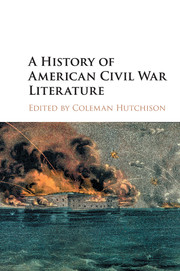Book contents
- Frontmatter
- Dedication
- Contents
- List of Illustrations
- Notes on Contributors
- Preface
- Acknowledgments
- Part I Contexts
- 1 Harriet Beecher Stowe and the “Book That Made This Great War”
- 2 The American Book Trade and the Civil War
- 3 The Transatlantic History of Civil War Literature
- 4 The “American Renaissance” after the American Civil War
- 5 The Realists’ Civil War
- Part II Genres
- Part III Figures
- Recommendations for Further Reading
- Index
3 - The Transatlantic History of Civil War Literature
from Part I - Contexts
Published online by Cambridge University Press: 05 December 2015
- Frontmatter
- Dedication
- Contents
- List of Illustrations
- Notes on Contributors
- Preface
- Acknowledgments
- Part I Contexts
- 1 Harriet Beecher Stowe and the “Book That Made This Great War”
- 2 The American Book Trade and the Civil War
- 3 The Transatlantic History of Civil War Literature
- 4 The “American Renaissance” after the American Civil War
- 5 The Realists’ Civil War
- Part II Genres
- Part III Figures
- Recommendations for Further Reading
- Index
Summary
Beyond the national polity it fractured, beyond the romance of continental manifest destiny it unsettled, the U.S. Civil War perturbed North Atlantic spheres of belonging that had oriented a larger midcentury, romantically inflected U.S. literary culture. Consider in that way Mary Boykin Chesnut's regret, recorded in a diary entry she wrote seven months into the war, over having subscribed to several British periodicals the prior January, when printed materials could more easily cross the Atlantic into the southern section of the then United States. Beyond her irritation at having paid for publications now subject to the federal blockade, Chesnut rues still more the winnowing of her once cosmopolitan reading list. “Everything stopped with Fort Sumter,” she opines. “How I miss that way of looking out into the world! The war has cost me that. How much more?”
The war had cost Chesnut her worldly vantage not simply by dint of federal prohibitions on imports including publications such as Blackwood's or Cornhill Magazine, to name two periodicals Chesnut mentions. After predictions that Britain would ally itself to the Confederacy proved too sanguine, it would exact from her a sense of transatlantic kinship even while distorting her sense of geopolitical reality. Officially neutral with regard to the U.S. conflict (even if merely, in the bywords of the Palmerston government, “at present”), “England is patting both sides on the back,” she writes. “She loves to see a Kilkenny cat fight. After all, she is not dying for the want of our cotton. She is prospering and pampering her India cotton and will magnanimously accept any apology for the Mason and Slidell affair that smart Yankee Seward will tender her” (MC 241). In fact, the operatives at hundreds of Lancashire and Yorkshire mills were starving, not prospering, as a result of cotton shortages secession had caused. And in fact, although armed conflict with the northern states was averted (according to Tennyson in his 1862 Dedication for Idylls of the King, only through a well-placed word of Albert's, and thence a recalled letter of Victoria's), British heads of state and of government can hardly be said to have leapt at the diplomatic overtures of the Lincoln administration.
- Type
- Chapter
- Information
- A History of American Civil War Literature , pp. 33 - 47Publisher: Cambridge University PressPrint publication year: 2015



